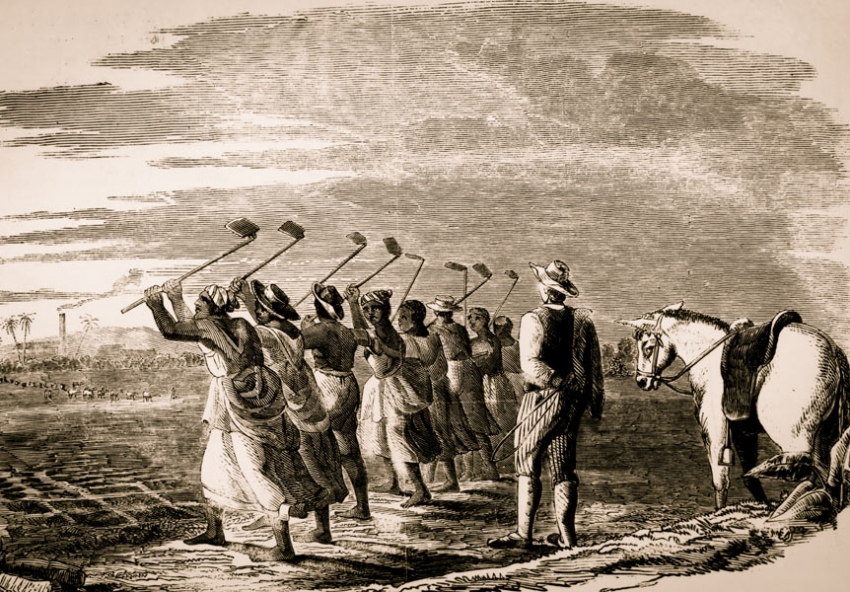 Slaves on a sugar plantation in the West Indies, watched by a white supervisor with a whip. (Illustration via Hulton Archive/Getty Images)
Slaves on a sugar plantation in the West Indies, watched by a white supervisor with a whip. (Illustration via Hulton Archive/Getty Images)
It’s time for a Marshall Plan for black Americans.
Slavery’s damaging legacy continues to endure because strategies for redress have been limited by the conventional wisdom of the time and white resistance to compensatory programs.
Despite this nation’s adamant refusal to address the damaging legacy of 250 years of slavery and another 100 years of Jim Crow apartheid, the issue of reparations has made a decided comeback in American discourse.
The latest jolt of revival began in the Caribbean. On March 10, the 15-nation Caribbean Community (CARICOM) approved a 10-point plan to demand “reparatory justice for … the victims of Crimes Against Humanity in the forms of genocide, slavery, slave trading and racial apartheid from former European colonizers.” According to attorney Martyn Day, of Leigh Day, the British human rights legal firm that represents CARICOM, the firm will file a class-action suit in the International Court of Justice if European officials fail to take the plan seriously.
This surprisingly audacious Caribbean demand was followed by an April rally in Chicago intended to rekindle the enthusiasm that 13 years ago fueled a reparations bandwagon that was ultimately knocked off course by the 9/11 terrorist attacks.
These efforts seek to make the case for reparative justice and compensation based on the horrific crimes of slavery, its legacy of racial oppression and social exclusion, and the unjust enrichment of whites from the structural misdistribution of resources. Slavery, say CARICOM and its fellow travelers in the United States, casts a long shadow.
But that shadow is getting harder to discern for slavery’s beneficiaries. Many Americans now interpret those sordid annals of slavery and Jim Crow as a narrative of triumph. In their minds, the Civil Rights Movement has expunged America of its original sin. It’s time to move on. After all, we’ve got a black president.
Then, in May, Ta-Nehisi Coates flipped the script. In a blockbuster Atlantic cover story, Coates made a case for reparations that focused not on slavery, but on the discriminatory federal programs that denied black Americans access to mortgages and other federal benefits, focusing on people still alive who can personally bear witness to the discrimination they faced.
Coates, whom I also featured in my last column, has emerged as one of the most insightful writers on race in mainstream journalism. His Atlantic story transformed the discussion from an assessment of racial attitudes into a detailed accounting of how biased policies affected the distribution of wealth and poverty. In doing so, he relocates the injury from 19th-century slavery and KKK-style oppression to 21st-century education and housing discrimination.
Many thinkers have weighed in on Coates’ piece; however, even those who praise his research doubt that this nation can muster the national will for such an effort. But Coates argues that the need for a massive national investment is not negated by its current political implausibility.
He’s right. Slavery’s damaging legacy continues to endure because strategies for redress have been limited by the conventional wisdom of the time and white resistance to compensatory programs. But if we are to make real progress in reducing the nation’s growing racial disparities, we have to devise more comprehensive policies. A strategy that has been consistently proposed by experts and activists is a domestic program akin to the Marshall Plan the United States enacted to bring Europe back from WWII. This plan would focus considerable resources on education, housing, job training, business development, etc., for a community chronically underserved.
The notion of reparations provides a historical justification for the massive investment of resources necessary to make a real change. Coates’ essay helps clarify that rationale and thus chips away at the conventional wisdom blocking compensatory policies.
What’s more, the momentum of his logic can further the realization that slavery’s unaddressed legacy cripples this entire nation’s potential. The statistical fact that one in three black men in the United States will be incarcerated in their lifetimes hobbles our economic potential and robs our future. Right now, a number of scavenger industries, like private prisons, are recouping the costs. But that’s a stopgap solution, as the prison-industrial complex is facing diminishing returns from the corrosive social consequences of our culture of criminalization. Soon, the costs of inattention will be too great to ignore.
 Salim Muwakkil is a senior editor of In These Times, where he has worked since 1983. He is the host of “The Salim Muwakkil” show on WVON, Chicago’s historic black radio station, and he wrote the text for the book HAROLD: Photographs from the Harold Washington Years.
Salim Muwakkil is a senior editor of In These Times, where he has worked since 1983. He is the host of “The Salim Muwakkil” show on WVON, Chicago’s historic black radio station, and he wrote the text for the book HAROLD: Photographs from the Harold Washington Years.















